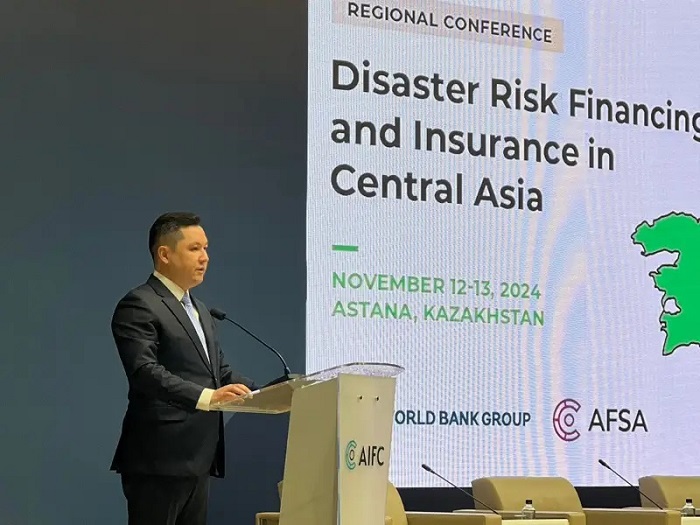 Astana hosts the Central Asian forum on disaster financing and insurance, bringing together key stakeholders from across the region to address the urgent need for financial preparedness in battling natural disasters. Government leaders, insurance regulators, private sector representatives, and international experts looked into both the financial and logistical demands of responding to these crises and the importance of cross-border cooperation, Kazinform News Agency reports from the event.
Astana hosts the Central Asian forum on disaster financing and insurance, bringing together key stakeholders from across the region to address the urgent need for financial preparedness in battling natural disasters. Government leaders, insurance regulators, private sector representatives, and international experts looked into both the financial and logistical demands of responding to these crises and the importance of cross-border cooperation, Kazinform News Agency reports from the event.
The first panel session of the forum highlighted the urgent need for expanded disaster insurance coverage, increased emergency funds, and strengthened regional cooperation to mitigate the severe economic impacts of natural disasters. Speakers emphasized that proactive financial systems and cross-border partnerships are essential for building resilience across Central Asia.
Renat Bekturov, Managing Director of the Astana International Financial Center, opened the forum by underlining the scale of recent disasters in Kazakhstan. “This year alone, we have witnessed tragic and far-reaching events. Here in Kazakhstan, devastating floods displaced over 120,000 people and left extensive damage to our infrastructure. To support affected families and begin restoration, the government mobilized over 12 billion tenge and dedicated more than 38 billion tenge to reconstruction efforts.”
 He noted that the scale of this response reflects Kazakhstan’s commitment to disaster recovery but also highlights the immense strain these events place on financial resources. Referencing catastrophic flash floods in Spain, he remarked that “even well-prepared nations struggle with the scale of financial and logistical demands during catastrophic events,” urging for stronger financial systems and partnerships to address these shared challenges.
He noted that the scale of this response reflects Kazakhstan’s commitment to disaster recovery but also highlights the immense strain these events place on financial resources. Referencing catastrophic flash floods in Spain, he remarked that “even well-prepared nations struggle with the scale of financial and logistical demands during catastrophic events,” urging for stronger financial systems and partnerships to address these shared challenges.
Switzerland’s Ambassador to Kazakhstan, Salman Bal, echoed these sentiments, advocating for regional solidarity and knowledge sharing: “Disasters in one country often mirror or forewarn similar events in neighboring ones. (…) In this sense, a regional approach to risk sharing could help unlock resources and strengthen resilience across borders.”
The World Bank estimates that only earthquakes cause $2 billion in annual losses in Central Asia, impacting 4 million people each year. With climate change, floods are now a growing risk, potentially costing up to 6% of GDP. “Disaster risk financing and insurance are crucial for resilience in Central Asia,” said Indu John-Abraham, Operations Manager for the World Bank’s Regional Office.
She noted that limited insurance coverage may leave countries like Tajikistan and Uzbekistan facing disaster-related financial gaps of up to $1.5 billion and $15 billion, respectively, forcing reliance on budget reallocations, borrowing, or aid—diverting funds from critical needs like education and healthcare.
Speakers from the World Bank, Tajikistan’s Ministry of Finance, and Kazakhstan’s Agency for Financial Market Regulation presented detailed insights, each pointing to similar issues in disaster financing and risk mitigation. In his presentation, Martin Melecki from the World Bank highlighted a significant gap in disaster insurance coverage across developing regions. In developing countries, over 90% of disaster losses are uninsured. He also noted that, in Central Asia, less than 1% of GDP is covered by insurance, leaving governments with the challenging task of addressing recovery costs independently.
Shamsullo Khaibrullozoda, Tajikistan’s Deputy Finance Minister, described how disasters have caused over 1 billion somoni ($93,870,360.00) in damage in his country over the past decade. With support from the World Bank, the government has mobilized over $300 million to mitigate and recover from these impacts. He also noted that over the first 9 months of this year, almost 160 million somoni ($15,019,257.60) were spent to eliminate the consequences of natural disasters, 70% of which were mudflows, 15% were snowfalls, frosts and strong winds, and 13% were earthquakes and related hazards, of which more than 100 million ($9,387,036.00) were allocated from state reserves for unforeseen expenses.
 Ernst Kaldybaev, Kyrgyzstan’s Deputy Finance Minister, outlined the ongoing challenges his country faces in financing disaster response, noting, “Every year, we increase the emergency fund by 25%, but it is still only enough to address immediate needs.” For 2025, Kyrgyzstan has allocated 1.5 billion som ($17,401,392.15) for disaster-related projects, with an increase to 2 billion som ($23,201,856.20) planned for 2026.
Ernst Kaldybaev, Kyrgyzstan’s Deputy Finance Minister, outlined the ongoing challenges his country faces in financing disaster response, noting, “Every year, we increase the emergency fund by 25%, but it is still only enough to address immediate needs.” For 2025, Kyrgyzstan has allocated 1.5 billion som ($17,401,392.15) for disaster-related projects, with an increase to 2 billion som ($23,201,856.20) planned for 2026.
Kaldybaev also emphasized the importance of developing the insurance market as a solution, saying, “As for one of the tools for solving this problem, Kazakhstan also believes that it is the development of the insurance market, insurance. Today, this work has begun in our state insurance organization; certain good indicators have been achieved very dynamically, fairly low rates have been set for the population in the regions, they are acceptable, but this is only the beginning of the path.”
Kazakhstan’s Deputy Chair of the Agency for Financial Market Regulation, Maria Khadzhieva, spoke about the government’s efforts to aid flood recovery by building new housing and repairing homes. She praised the private sector’s significant contribution of 260 billion tenge but pointed to gaps in insurance coverage, noting that while voluntary property insurance is growing, only 3.2% of the population has insured housing.
Emphasizing the need for cross-border partnerships, Ernst Kaldybaev noted, “We have cooperation, but it is of a local nature. (…) We must be more prepared to help each other make a significant contribution to the elimination of technical situations. This will generally improve our relationships, trade relations, political, social.”
Maria Khadzhieva supported his statement, adding: “In situations where catastrophic risks arise, or in a crisis situation, when a crisis arises on the territory of one of our states, naturally, others provide support. So it turned out that we live in one Central Asian region, and, naturally, the risks that exist today, natural and catastrophic, are in fact public. In Kazakhstan, we are practically on the same plane, so these risks are more relevant to us than ever. Therefore, there are certain issues related to the need to create natural joint instruments, in general there should be reinsurance instruments. In the future, it is possible to create some common reinsurance funds. But today, each of our countries is at the stage of forming an initial reinsurance fund. It is probably too early, but we need to think about it.” ///cross post from Kazinform, 12 November 2024